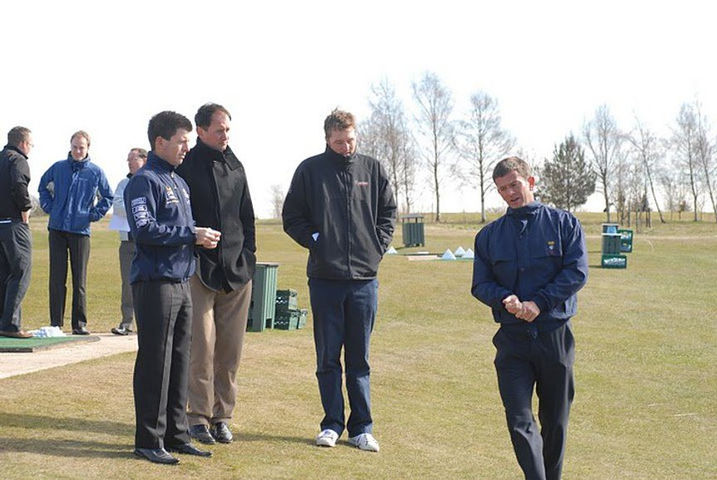MARK BENNETT MBE
Mark is a Performance Architect with 30+ years of experience creating strategies & tools to enhance performance.
He has developed methods to improve engagement, learning, & performance through designed interventions that influence culture & team performance.
This approach is known as Performance Development Systems (PDS).

About Mark Bennett MBE
With over three decades of experience working with & supporting global corporate businesses, business leaders, managers, elite sports teams, national sports organizations, & universities around the world, Mark has become a well-respected & highly regarded Performance Architect & a pioneer of the ‘Need-Centered’ approach to people & team performance.
During his thirty-plus years working with people performance at all levels, Mark has developed the ‘Performance Development Systems,’ a robust & flexible framework with strategies & principles that can assist organizations & teams in building high-performance cultures & people.
Mark has extensive experience working with the elite British military as a training designer, manager, coach, & senior instructor. He has also worked with both individual & team elite professional & amateur sports globally, including full seasons, & world, Paralympic, & Olympic preparation. Additionally, he has provided support to teams & national governing bodies. Mark also has experience supporting global business & educational organizations, including schools, colleges, & universities.
With this real-world experience combined with his relentless research into individual & team performance, Mark has identified the sources of what negatively impacts engagement, learning, judgment, decision-making, communication, behaviours, & teamwork; the critical influencers impacting culture & performance.
In business, Mark has worked with global clients, directly supporting owners & directors to establish world-leading interdependent environments, as well as running training & mentoring for senior management.
Within sports, Mark has worked with over thirty sports at all levels & age groups. This includes grassroots, professional & international teams, national sports organizations, & Olympic coaches. This includes Performance Directors, Head coaches, & managers, & all supporting staff.
Mark has also appeared on over fifty podcasts worldwide, sharing his ‘Need-Centered’ approach to people development.
He currently works as a consultant, coach of coaches, & mentor with various professional & national sports organizations, teams, & universities worldwide, to help transform the leadership capabilities of every director, manager, coach, & athlete he supports. In essence, Mark makes people better “influencers.”
Mark is also a sought-after keynote speaker who has presented globally to teams & national conferences, providing a more ‘real-world’ interactive delivery.
Mark's most shared quote “Performance is a behavior, not an outcome” summarizes his approach to people development.
Watch & listen to client feedback -
Listen to an Interview With Mark
Strategies for Achieving Peak Performance in Business & Sports
With time highlights below -
Listen to one of the 50-plus interviews I have been a guest on.
Here, you can hear, in my own words, my background, performance philosophy & some of my high-performance strategies.
Main timing markers -
-
4.10 - Introduction to my background
-
9.50 - The common connection to all my working environments
-
11.55 - What methodology similarities & differences are there in my Business, elite sports, military clients
-
16.05 - Understanding why 'vulnerability' & 'mistake' are words that can be misunderstood in High-Performance
-
18.35 - What is not a mistake in high-performance decision-making? Using a robust data, focussed review tool to conclude effective past judgement under pressure
-
20.24 - A powerful military example of why people's different success criteria drive their interpretation of results
-
23.48 - Comparisons between the Business developing cohesion under pressure & Military - micromanagement & the self-fulfilling prophecy
-
28.06 - The two elements Businesses do not invest in well enough
-
30.08 - A simple example of accelerating engagement & self-awareness
-
34.05 - A business example of identifying a source of any issue early & accurately
-
38.54 - Why it is critical to review when something has gone exceptionally well accurately; what did we do differently & why this is often missed
-
41.22 - "Slow down & be still in order to be quicker". What does that mean in High-Performance & clarity of intention
-
45.22 - Seeing value; "you don't have to like it -"
-
49.19 - Placing focus on developing effective decision-making & the actual commitment to a decision
-
52.25 - Having clarity of intention & commitment with UAEs
-
54.01 - The route of many problems in relationships & Business
-
57.36 - How to self-manage challenging interactions - one of my performance tools
-
1.02.38 - "Performance is a behaviour, not an outcome" What do I mean by that; what you can & can't control
-
1.07.57 - I ask the three hosts what their most significant takeaways from this conversation are

































